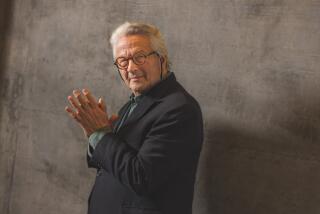James Miller, 86; Educator, Psychiatrist
- Share via
Dr. James Grier Miller, a visionary educator and psychiatrist who coined the term “behavioral science” and founded a field devoted to analyzing living systems, died Nov. 7 at his La Jolla home. He was 86.
During a wide-ranging career over six decades, Miller also headed a university, founded a virtual university, invented an information clearinghouse linking 500 institutions of higher education and launched a scholarly journal, which is still in print after 46 years.
Colleagues described him as an intellectual dynamo in the worlds of education and research.
“He did research at the level of the cell and at the level of the organization, at the same time. Not many people can do that,” said UCLA sociology professor Kenneth D. Bailey, who is also president-elect of an international society devoted to the living-systems theory Miller propounded.
Born in Pittsburgh, Miller was headed for the ministry when he convinced his father that he was better suited for a career in science. Miller studied briefly at Columbia Bible College in South Carolina before switching to Harvard University, where he earned his bachelor’s, master’s, doctoral and medical degrees between 1937 and 1943.
Trained as a psychiatrist, he entered the Army Medical Corps in 1943, later transferring to a unit that conducted psychological evaluations of candidates for agents in the Office of Strategic Services, the precursor to the CIA. At Harvard, he was a student of Alfred North Whitehead, the eminent philosopher. Whitehead encouraged him to develop a theoretical framework combining the biological and social sciences.
Later, when Miller was teaching psychiatry at the University of Chicago, Enrico Fermi, the physicist who had a leading role in the creation of the atomic bomb, prodded him in the same direction.
“Fermi was so concerned that his invention would destroy mankind that he told Jim if the biological and social sciences do not make advances commensurate with the natural sciences, we will destroy ourselves as the human race,” said G.A. Swanson, a professor at Tennessee Technological University and longtime colleague and friend of Miller’s. Fermi “believed we needed general theories in the social sciences in order get the advances necessary to avoid calamity.”
Intrigued by Fermi’s idea, and with his considerable support, Miller formed a research group of senior professors -- each of whom studied life from a different perspective -- to integrate their disciplines.
In 1949, after years of searching for a term that would describe the end product of their endeavor, Miller came up with “behavioral science” -- the first use of the term in its current sense, according to Swanson. The Ford Foundation later offered grants for studies in behavioral science, which gave wide currency to the term.
The behavioral science approach, Miller later said, “makes it possible to recognize real, precise similarities between a single person as a system, a behaving group like a jury, a large company ... a government or even the United Nations.”
Miller synthesized two decades of thinking about the field in “Living Systems,” an encyclopedic volume published by McGraw-Hill in 1975, which identified the common principles linking biological and social systems, from a single human cell to multinational corporations and nations. Systems as different as a heart cell or a jury, for instance, have similarities in their needs for a flow of information or energy, Miller said.
The goal, he wrote, was to demonstrate “the elegant unity of the world’s living and nonliving systems, as well as the feasibility of a unified science to study them.”
Miller began to formulate his thoughts on integrating the sciences in the late 1940s and early ‘50s while at the University of Chicago, where he headed the psychology department. Later, at the University of Michigan, he was the founding director of the school’s Institute of Behavioral Science, later renamed the Mental Health Research Institute.
With his psychologist-wife he launched the journal Behavioral Science in 1956 and was its editor for the next 30 years. The journal later merged with another publication and was renamed Systems Research and Behavioral Science. It publishes original articles on new theories, experimental research and applications relating to all levels of living and nonliving systems.
In 1973, Miller was named president of the University of Louisville in Kentucky and presided over its transition from a private to a public institution.
He also helped found the information network known as EDUCOM, which later spawned the electronic exchange called EDUNET.
Miller moved to California in the early 1980s, where he was co-chairman of the Robert Maynard Hutchins Center for the Study of Democratic Institutions in Santa Barbara and held adjunct professorships at UC San Diego and UC Santa Barbara. He also taught courses at UCLA.
In retirement, he founded the University of the World, an attempt to promote distance education internationally.
His collaborator and wife of 64 years, the former Jessie Louise Luthi, died earlier this year. Miller is survived by two sons, Thomas of San Clemente and John of Indianapolis, and three grandchildren.
More to Read
Sign up for Essential California
The most important California stories and recommendations in your inbox every morning.
You may occasionally receive promotional content from the Los Angeles Times.











